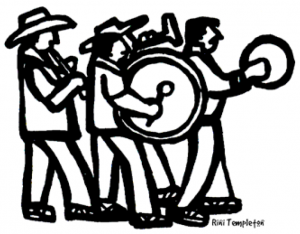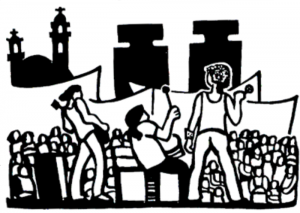On December 1st, thousands of people took to the streets of Mexico City to celebrate the inauguration of Andres Manuel Lopez Obrador as the new president of the Mexican Republic. This took place after one of the longest transitions in recent history. For 6 months after the June 1 election, two governments existed— that of Enrique Pena Nieto and that of Lopez Obrador.

A complex environment for the transition
Because financialized capitalism is structurally unstable, daily governance hangs by a thread on the risk rating agencies. If the government doesn’t control inflation, ensure financial stability and maintain fiscal balance and budgetary discipline, it will not pass the confidence test of bankers and international investors. As a result, bankers and investors can slowly or rapidly undermine the credibility of any alternative government and sink any plans for change.
The transition from Pena Nieto to Lopez Obrador saw the hasty signing of the Mexican-US-Canada Treaty (a new name for NAFTA). This new agreement repeats all the socially discredited aspects of NAFTA and imposes new and substantial restrictions on the new government and on Mexican, American and Canadian workers.
Also, during this transition from one government to the next, Mexicans lived through the conflict-ridden exodus of Central American migrants (Hondurans, Salvadorans and Guatemalans) to the United States. This exodus created a crisis at Mexico’s southern border and temporarily militarized the US/Mexican border. In cities like Tijuana, the conflict produced the same expressions of racism, xenophobia and intolerance that are the basic ingredients of Donald Trump’s policies.
Furthermore, during the transition, there were sudden drops in the stock market and a devaluation of the peso against the dollar. This was due to the announcement of the cancellation of a project to construct a new luxury airport above an aquifer northeast of Mexico City, along with revisions to the commissions that banks charge in Mexico – charges that are double the ones imposed by the same banks in their home countries. All of this was taking place coincidentally with the US-China trade war and a slowdown in the global economy.
Business interests used the media to attack the new government’s alleged intention to change management rules for pension funds, along with attacks by parties displaced from power, all trying to recover ground they lost in the June election.
In the state of Guanajuato, one of the most conservative regions of the country controlled by the right wing PAN party, a limit was placed on the supply of gasoline. Guanajuato was the first state to open their gas stations to transnational corporations in 2018. This new limit on gasoline supply created bewilderment and anger among automobile drivers.
Corruption and the neoliberal model
During the official inauguration in front of members of the House and Senate, governors and special guests, while ex-president Pena Nieto sat by his side, Lopez Obrador castigated neo-liberalism with its economics of inequality, its poverty and marginalization, its impunity and cynical respect for the corruption that flourished in Mexico under previous governments, as a true disaster for Mexico.
Lopez Obrador made clear that he is not only initiating a new government, but also a change in the politics of the regime itself. His changes will be peaceful and orderly, yet at the same time, radical and profound, because they will end corruption and impunity.
He reiterated that the neo-liberal economic model is both a foreign idea and one that leads to de-nationalization because it concedes territory, businesses and public benefits to private and foreign businessmen. He denounced corruption as the principal tool of political power and noted the importance of separating economic and political power. But he stressed all this right after announcing his Advisory Board— made up almost entirely of the great men of Mexican business. He did this to calm the jitters of businessmen worried about the cancellation of the new airport.
It was not surprising to see that upon taking office, Lopez Obrador reiterated that he will not raise the price of gasoline, nor increase the public debt. He will respect the signed contracts made by the previous government and the autonomy of the central bank of Mexico.
A choice to rely on the military
What was a surprise it was to see him announce the formation of a National Guard, constitutionally armed or not, made up of the army, marines and Federal police which will continue the militarized strategy to combat drugs. This also implies that Lopez Obrador is placing the guarantee of democratic rights and freedoms in military structures. In the past, this policy has created a colossal humanitarian crisis throughout the entire country. What happened to the demand for an immediate peace that was the key factor that motivated millions of people to vote for Lopez Obrador?
Lopez Obrador said he would live in his own home and that “Los Pinos,” the official residence of Mexican presidents, will be opened to the public. This will allow people to see how ex-presidents led a luxurious life equivalent to the sheiks of the Middle East while most of the country lacked basic needs.
A question of representation
After the inauguration, Lopez Obrador attended a massive gathering in the capital’s Zocalo where representatives of sixty-eight indigenous communities awarded him the “Baston de Mando.” As he took this “baton of command,” Lopez Obrador exhorted the people who filled the Zocalo “not to leave me alone, without you, I am worthless—or almost worthless.”
After the festivities, this celebratory act became controversial. First, it was criticized as too folkloric, with the burning of incense, prayers and invocations to the four cardinal points. Second, and above all, it was controversial because the gathering that gave the “Baston de mando” did not represent the indigenous people. Leaders should not have spoken in the name of the indigenous movement as this act appeared to suggest that they were the main interlocutors with the government of Lopez Obrador.
The question of representation of this group is not a minor matter. Lopez Obrador has ratified three large projects as part of his development plan: the Multi-Modal Trans-Isthmus Corridor from the Pacific to the Gulf of Mexico, the “Maya Train,” and a refinery in Tabasco. He said he would expand the existing airport by adding two runways.
In sum, Lopez Obrador is proposing some old mega projects in indigenous territories without the detailed consultation that is clearly required by Convention 169 of the International Labor Organization. It’s also important to point out that it was the neoliberal government of Vicente Fox (2000-2006) that proposed the Trans-Isthmus Corridor as part of the “Plan Puebla Panama.”
Will there be an end to the neoliberal project?
With regard to these projects, numerous experts have pointed out that predatory modernity has already left its effect on Merida, Cancun, Campeche and Chetumal. In these cities, tourism, commerce and real estate development have destroyed biocultural patrimony and generated “progress” that is unjust, unstable and destructive. This has occurred because there has been no joint action between governments at the federal, state and municipal level with local communities, peoples and indigenous groups. For this reason, these experts argue publicly for the construction of an ecological, social and solidarity economy guided by a deep biocultural respect and the defense of life in all its forms.
Lopez Obrador has also stated his intention to cancel neoliberal education reform, to offer free medical care in marginalized zones, to construct a “Truth Commission” to punish the abuse of authority and to deal with the case of the forty-three disappeared youth from the town of Ayotzinapa. He announced that he will pay attention to Mexico’s fifty-four million poor people, give ten million scholarships to young people and double economic support to older adults and those with disabilities. Without a doubt, he is listening to some of the popular demands for fundamental change.
The hard task of converting hope into reality
And finally, in a controversial move, Lopez Obrador announced that he was not thinking of prosecuting functionaries from previous governments because he is not motivated by vengeance. Rather, he is “in favor of forgiveness and forbearance.” Given the flagrant cases of corruption by public officials at all levels of government under Enrique Pena, this announcement could violate the rule of law and perpetuate impunity. It cannot be an option for an individual president to say, “I pardon you,” and forget it. He must act within existing law against corrupt functionaries, otherwise their crimes will go unpunished and thus perpetuate impunity.
In all of Andres Manuel Lopez Obrador’s actions, from his Inauguration to the Zocalo mobilization to the popular festivals with the hope for a changed Mexico, everyone is aware that change will not occur from one day to the next but at least there is light at the end of the tunnel. If achieving this change was hard, it will be even harder to convert this hope into reality. The discourse versus the reality demonstrates the path that we are walking.
Alejandro Alvarez Bejar is a Professor of Economics at the National Autonomous University of Mexico (UNAM), a member of the Trinational Coalition for the Defense of Public Education and a Honorary Commander of the Heroico Batallon de San Patricio. Translation by Dan Leahy

Be First to Comment